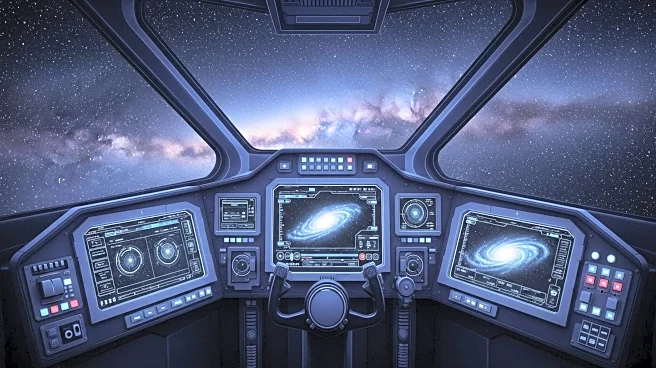What's Happening?
CCP Games is developing a new space survival MMO, EVE Frontier, which aims to expand the universe of EVE Online. The game will allow players to explore a new galaxy, gather resources, and build bases using realistic simulations and algorithms. Software engineers Helgi Freyr Rúnarsson and Guðlaugur Jóhannesson, both with backgrounds in astrophysics, are leading the project. They have applied the Barnes-Hut algorithm to simulate a three-galaxy merger, providing players with a dynamic environment to explore. The game incorporates scientific principles while balancing gameplay needs, offering a unique blend of realism and entertainment.
Why It's Important?
EVE Frontier represents a significant advancement in the integration of scientific simulations within gaming, potentially setting a new standard for realism in virtual environments. By leveraging astrophysical algorithms, CCP Games is enhancing the depth and complexity of the gaming experience, appealing to both science enthusiasts and gamers. This approach may influence future game development, encouraging other studios to incorporate scientific elements to enrich gameplay. The project also highlights the growing intersection between gaming and scientific research, offering educational opportunities alongside entertainment.
What's Next?
As EVE Frontier continues development, CCP Games will likely refine its balance between scientific accuracy and gameplay enjoyment. The game's release could prompt discussions on the role of science in gaming, potentially inspiring similar projects. The integration of blockchain elements and player-driven systems may also attract interest from the broader gaming community, influencing future trends in game design and player engagement.
Beyond the Headlines
The development of EVE Frontier raises questions about the ethical implications of using scientific simulations in entertainment. While the game offers a realistic portrayal of space exploration, it also necessitates compromises for gameplay purposes. This balance between accuracy and playability may spark debates on the responsibilities of game developers in representing scientific concepts. Additionally, the use of blockchain technology introduces considerations regarding digital ownership and economic models within virtual worlds.









